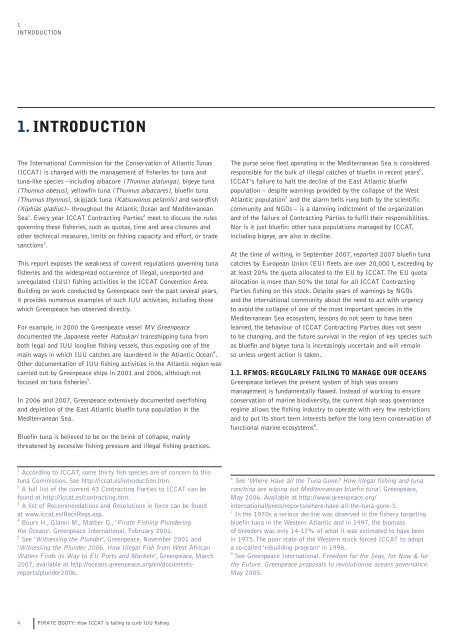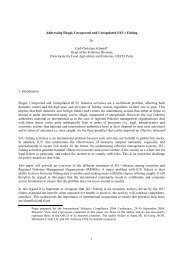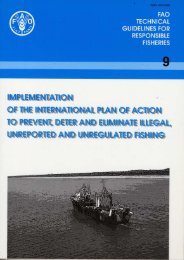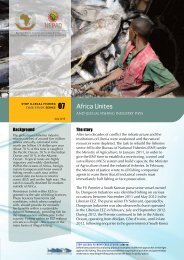How ICCAT is failing to curb IUU - International MCS Network
How ICCAT is failing to curb IUU - International MCS Network
How ICCAT is failing to curb IUU - International MCS Network
You also want an ePaper? Increase the reach of your titles
YUMPU automatically turns print PDFs into web optimized ePapers that Google loves.
1INTRODUCTION1. INTRODUCTIONThe <strong>International</strong> Comm<strong>is</strong>sion for the Conservation of Atlantic Tunas(<strong>ICCAT</strong>) <strong>is</strong> charged with the management of f<strong>is</strong>heries for tuna andtuna-like species –including albacore (Thunnus alalunga), bigeye tuna(Thunnus obesus), yellowfin tuna (Thunnus albacares), bluefin tuna(Thunnus thynnus), skipjack tuna (Katsuwonus pelam<strong>is</strong>) and swordf<strong>is</strong>h(Xiphias gladius)– throughout the Atlantic Ocean and MediterraneanSea 1 . Every year <strong>ICCAT</strong> Contracting Parties 2 meet <strong>to</strong> d<strong>is</strong>cuss the rulesgoverning these f<strong>is</strong>heries, such as quotas, time and area closures andother technical measures, limits on f<strong>is</strong>hing capacity and effort, or tradesanctions 3 .Th<strong>is</strong> report exposes the weakness of current regulations governing tunaf<strong>is</strong>heries and the widespread occurrence of illegal, unreported andunregulated (<strong>IUU</strong>) f<strong>is</strong>hing activities in the <strong>ICCAT</strong> Convention Area.Building on work conducted by Greenpeace over the past several years,it provides numerous examples of such <strong>IUU</strong> activities, including thosewhich Greenpeace has observed directly.For example, in 2000 the Greenpeace vessel MV Greenpeacedocumented the Japanese reefer Hatsukari transshipping tuna fromboth legal and <strong>IUU</strong> longline f<strong>is</strong>hing vessels, thus exposing one of themain ways in which <strong>IUU</strong> catches are laundered in the Atlantic Ocean 4 .Other documentation of <strong>IUU</strong> f<strong>is</strong>hing activities in the Atlantic region wascarried out by Greenpeace ships in 2001 and 2006, although notfocused on tuna f<strong>is</strong>heries 5 .In 2006 and 2007, Greenpeace extensively documented overf<strong>is</strong>hingand depletion of the East Atlantic bluefin tuna population in theMediterranean Sea.Bluefin tuna <strong>is</strong> believed <strong>to</strong> be on the brink of collapse, mainlythreatened by excessive f<strong>is</strong>hing pressure and illegal f<strong>is</strong>hing practices.The purse seine fleet operating in the Mediterranean Sea <strong>is</strong> consideredresponsible for the bulk of illegal catches of bluefin in recent years 6 .<strong>ICCAT</strong>’s failure <strong>to</strong> halt the decline of the East Atlantic bluefinpopulation – despite warnings provided by the collapse of the WestAtlantic population 7 and the alarm bells rung both by the scientificcommunity and NGOs – <strong>is</strong> a damning indictment of the organizationand of the failure of Contracting Parties <strong>to</strong> fulfil their responsibilities.Nor <strong>is</strong> it just bluefin: other tuna populations managed by <strong>ICCAT</strong>,including bigeye, are also in decline.At the time of writing, in September 2007, reported 2007 bluefin tunacatches by European Union (EU) fleets are over 20,000 t, exceeding byat least 20% the quota allocated <strong>to</strong> the EU by <strong>ICCAT</strong>.The EU quotaallocation <strong>is</strong> more than 50% the <strong>to</strong>tal for all <strong>ICCAT</strong> ContractingParties f<strong>is</strong>hing on th<strong>is</strong> s<strong>to</strong>ck. Despite years of warnings by NGOsand the international community about the need <strong>to</strong> act with urgency<strong>to</strong> avoid the collapse of one of the most important species in theMediterranean Sea ecosystem, lessons do not seem <strong>to</strong> have beenlearned, the behaviour of <strong>ICCAT</strong> Contracting Parties does not seem<strong>to</strong> be changing, and the future survival in the region of key species suchas bluefin and bigeye tuna <strong>is</strong> increasingly uncertain and will remainso unless urgent action <strong>is</strong> taken.1.1. RFMOS: REGULARLY FAILING TO MANAGE OUR OCEANSGreenpeace believes the present system of high seas oceansmanagement <strong>is</strong> fundamentally flawed. Instead of working <strong>to</strong> ensureconservation of marine biodiversity, the current high seas governanceregime allows the f<strong>is</strong>hing industry <strong>to</strong> operate with very few restrictionsand <strong>to</strong> put its short term interests before the long term conservation offunctional marine ecosystems 8 .1 According <strong>to</strong> <strong>ICCAT</strong>, some thirty f<strong>is</strong>h species are of concern <strong>to</strong> th<strong>is</strong>tuna Comm<strong>is</strong>sion. See http://iccat.es/introduction.htm.2 A full l<strong>is</strong>t of the current 43 Contracting Parties <strong>to</strong> <strong>ICCAT</strong> can befound at http://iccat.es/contracting.htm.3 A l<strong>is</strong>t of Recommendations and Resolutions in force can be foundat www.iccat.es/RecsRegs.asp.4 Bours H., Gianni M., Mather D., ‘Pirate F<strong>is</strong>hing Plunderingthe Oceans’. Greenpeace <strong>International</strong>, February 2001.5 See ‘Witnessing the Plunder’, Greenpeace, November 2001 and‘Witnessing the Plunder 2006. <strong>How</strong> Illegal F<strong>is</strong>h from West AfricanWaters Finds its Way <strong>to</strong> EU Ports and Markets’, Greenpeace, March2007, available at http://oceans.greenpeace.org/en/documentsreports/plunder2006.6 See ‘Where Have all the Tuna Gone? <strong>How</strong> illegal f<strong>is</strong>hing and tunaranching are wiping out Mediterranean bluefin tuna’. Greenpeace,May 2006. Available at http://www.greenpeace.org/international/press/reports/where-have-all-the-tuna-gone-3.7 In the 1970s a serious decline was observed in the f<strong>is</strong>hery targetingbluefin tuna in the Western Atlantic and in 1997, the biomassof breeders was only 14-17% of what it was estimated <strong>to</strong> have beenin 1975.The poor state of the Western s<strong>to</strong>ck forced <strong>ICCAT</strong> <strong>to</strong> adopta so-called ‘rebuilding program’ in 1998.8 See Greenpeace <strong>International</strong>. Freedom for the Seas, for Now & forthe Future. Greenpeace proposals <strong>to</strong> revolution<strong>is</strong>e oceans governance.May 2005.4 PIRATE BOOTY: <strong>How</strong> <strong>ICCAT</strong> <strong>is</strong> <strong>failing</strong> <strong>to</strong> <strong>curb</strong> <strong>IUU</strong> f<strong>is</strong>hing
















